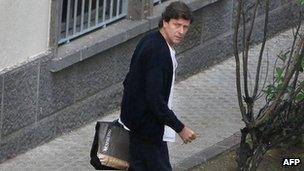Spain's Dr Eufemiano Fuentes in court for cyclists' doping
- Published

Dr Eufemiano Fuentes is on trial with his sister and three former cycling coaches
A Spanish doctor has appeared in court accused of running one of the world's largest sports doping rings.
Dr Eufemiano Fuentes's trial in Madrid comes nearly seven years after police raided his offices and seized some 200 bags of blood which were linked to a number of top cyclists.
Dozens of cyclists have been called to testify as witnesses in the trial.
Dr Fuentes, his sister and three former cycling coaches are charged with breaking public health laws.
They could not be charged with doping-related crimes because Spain had no anti-doping law at the time of their arrest.
Prosecutors must prove that the defendants' actions put the lives of the athletes at risk - something the defence is expected to deny.
Monday saw only opening legal arguments. Dr Fuentes's testimony was postponed until Tuesday morning.
The case comes days after former seven times Tour de France winner Lance Armstrong admitted to using banned drugs and blood doping during his cycling career.
Code-names
Spanish police carried out a series of raids on offices, laboratories and flats in Madrid, Zaragoza and El Escorial in May 2006 as part of an investigation known as Operation Puerto.
They found about 200 bags of blood or frozen plasma with labels that were believed to be code-names for Dr Fuentes's clients - athletes who were allegedly benefiting from a highly-sophisticated doping programme.
Dozens of cyclists were allegedly implicated in the scandal, including former Tour de France winner Alberto Contador, who is expected to give evidence in the trial.
The World Anti-Doping Agency has said that it was told, at the time of the raids, that the bags of blood also related to athletes from several sports, including football and tennis.
But the trial will focus only on cyclists who, according to the chief prosecutor in the case, are the only athletes that could be identified from the bags of blood seized.
The trial is expected to last until mid-March.
If found guilty, the defendants could face up to two years in prison and a two-year professional ban.
- Published18 January 2013